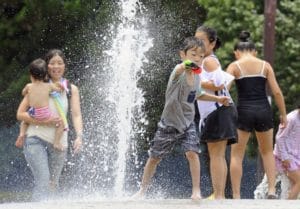Soaring summer temperatures in Europe and Central Asia are killing nearly 400 children a year, according to new analysis of the latest available data by the UN Children’s Fund (UNICEF) released on Wednesday, July 24, 2024.

UNICEF revealed that 377 children died in 2021 based on data from 23 countries across the vast region.
Heat-related illnesses claimed the lives of half of those vulnerable youngsters in the first year of their lives.
“Around half of children across Europe and Central Asia – or 92 million children – are already exposed to frequent heatwaves in a region where temperatures are rising at the fastest rate globally,” Regina De Dominicis, UNICEF Regional Director for Europe and Central Asia, said.
She warned that increasingly high temperatures could seriously complicate a child’s health, even in a short time frame.
“Without care, these complications can be life-threatening,” she said.
According to UNICEF, heat exposure can have acute effects on a child even before they are born which can lead to pre-term births, low birth weight, stillbirth, and congenital anomalies.
The agency also noted that heat stress could directly lead to death, affect infant growth and be a gateway to paediatric diseases.
Further, UNICEF said that “extreme heat caused the loss of more than 32,000 years of healthy life among children and teenagers in the region.”
2024 has seen record high temperatures with this June registering as Earth’s hottest on record. It was the thirteenth record-setting month in a row.
UNICEF is urging governments in Europe and Central Asia to invest in “heat health action plans and primary healthcare to more adequately support heat-related illness among children.”
The children’s agency is also calling on governments to invest more in heat alert systems, ensure educational facilities reduce temperatures in areas where children play and securing safe provision of drinking water.
Other measures include equipping buildings to minimise exposure and establishing strategies to reduce the impact of heatwaves overall and especially for children.
UNICEF says they are working with governments and communities across Europe and Central Asia to “build resilience against heatwaves” by providing teachers, family and community health workers with the knowledge and skills to combat heat stress.
By Cecilia Ologunagba
